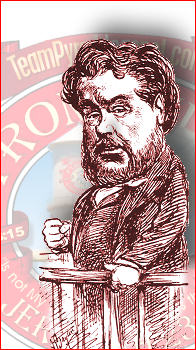posted by Phil Johnson
The PyroManiacs devote some space each weekend to highlights from The Spurgeon Archive. The following excerpt is from "How To Meet the Evils of the Age," chapter 4 in An All-Round Ministry.
 andel, on one occasion, played the organ in a country church; and, at the close of the service, he gave a voluntary of such a sort that all the people lingered to hear it. The old organist [who usually played in that church] was indignant, and said, "Now, let that organ alone, you can't play the people out; let me do it."
andel, on one occasion, played the organ in a country church; and, at the close of the service, he gave a voluntary of such a sort that all the people lingered to hear it. The old organist [who usually played in that church] was indignant, and said, "Now, let that organ alone, you can't play the people out; let me do it." These progressive gentlemen certainly can play the people out. Their gifts of dispersion are amazing. Put them down in any warm-hearted Christian community, and see if they will not scatter and divide it; place them in any town you may select, and though they may be at first attractive (for some people are attracted by any novelty, however erroneous), yet, after a short time, there being no life, there will be no power to retain the people.
These progressive gentlemen certainly can play the people out. Their gifts of dispersion are amazing. Put them down in any warm-hearted Christian community, and see if they will not scatter and divide it; place them in any town you may select, and though they may be at first attractive (for some people are attracted by any novelty, however erroneous), yet, after a short time, there being no life, there will be no power to retain the people.We remember the experiment of Daventry, under that eminently godly man, Dr. Doddridge, and we are not inclined to try the like under any circumstances. That worthy man did not dogmatize to "the dear young men" who came to his College, but adopted the plan of letting them hear the argument upon each side, that they might select for themselves. The result was as disastrous as if error had been taught, for nothing is worse than lukewarmness as to truth. Dissent became enervated with a faint-hearted liberalism, and we had a generation of Socinians, under whom Nonconformity almost expired. Both General and Particular Baptists have had enough of this evil leaven, and we are not inclined to put it again into the people's bread.
Besides, we are invited to follow the guidance of men who are not qualified to be leaders. I have waited, with a good deal of interest, to see whether modern thought would be capable of producing a man, a man of mark, of profound mind, and philosophic genius; but where is he? Where is the man who will found a school, and sway his fellows; a man for the orthodox to tremble at, a great Goliath, head and shoulders above his fellows? Truly, there are some who think they have power, and so they have amongst those young gentlemen whose moustachios are on the point of developing; but they have no influence over those who read their Bibles, have had experience, and are accustomed to "try the spirits."
The great lights are the literary men who produce articles in certain Reviews which are the oracles of the elite, or of those who think themselves so. I wonder how many of these precious Reviews are sold; but that, of course, is of small consequence, because the quality of their readers is so high! See what airs a man gives himself because he reads a Review!
Are these things so very clever? I am unable to see it. I used to hear that Evangelical writers produced platitudes; I believe they did, but surely they never wrote more watery trash than is published in the present day in opposition to the orthodox faith; but then, you see, it is given out in such a Latinized jargon that its obscurity is mistaken for profundity. If you have the time and patience to read a little of what is written by the modern-thought gentlemen, you will not be long before you are weary of their word-spinning, their tinkering of old heresies into original thought, and their general mystifying of plain things.
It only needs a man of power to smash them up like potters' vessels, but then the result would only be pieces of broken pottery. "Show us a man worth following," say we, "and when you do, we will not follow him, but fight with him; at the present, we are not likely to leave Calvin, and Paul, and Augustine, to follow you."












5 comments:
Perhaps this comment would be more in place under another entry...but I am sure that what the professing church needs today is the simplicity we have in Christ. And that means the gospel of pure grace,and justification without works-clearly not overlaid with sanctification. We need it so that we have it's power for gospel sanctification-a 'grace for life'as well as starting the life. As to that grace,it must be free (and priceless)instead of cheap(and worthless)- whether that cheapness comes from using a substitute 'grace'as a cover-up to paper over an unregenerate heart-or from a law/grace amalgam that loses the essence of both law and grace with its mixed new covenant-and misses the essentiality of the new heart serving in a new and living way,albeit from a different angle. Feed me food of the essence of Spurgeon's 'all of grace'-because when you've tasted that gospel,there is no other. Add to that some clarification on grace as a rule of life-rather than law-my death and resurrection in Christ on the cross,to newness of life where all things are new-the indwelling Christ as my very life/ law, so that I can bring forth much fruit by the Spirit-and I will be a joyful man with a life worth living.
Phil, I've a musing/question for you, if you've the time and inclination. I'm catching up in order, and see that the current article is about India, so perhaps you don't want to turn back to this, busy as you are.
As we've discussed, I've also read and loved Spurgeon for decades. I agree with everything he says about truth. There is however one little sub-theme that arises frequently that isn't so golden to me, and I wonder what your thoughts are.
CHS frequently gives the impression, in so many words, that preaching the Gospel will fill a church, but preaching like a liberal will empty it out.
Now, if churches like his and Grace were the rule, we could nod in agreement. But you know the contrary Bible verses as well as I (2 Timothy 4:3-4 is just one that springs to mind), and I fear many have had a false hope because of it. They go out, preach faithfully — and their church empties out, or dwindles, or holds steady. It doesn't do a Spurgeon. It doesn't do a MacArthur. It does a Jeremiah instead.
I know CHS would say the real reason to preach the truth is because it's the truth, because God is our master and lord, because pleasing Him is paramount, and because only His Word will be used to save and sanctify souls. All true and sufficient reasons, and nobody says it better than he.
But he does seem, again and again, to add "— and it will bring people in!" Which I'd say may be but is not necessarily true.
Have you seen the same, or do you see it differently?
DJP - I'm not Phil, so I won't try to answer.
I noticed the same thing in this post. He talks as though readership for heretical/watery books will continue to dwindle. Given the book sale numbers for garbage like The Shack, New Kind of Christian, Blue Like Jazz, etc., it seems that there's always a ready and large market for theological ju-jubes.
This evening have I joined... the Knights of Reformed Theology!
*kneeling to wash people's feet*
Charlie
DJP - I'm still not Phil, and I'm trying not to have a "Phil Johnson complex", but I'll offer something.
Perhaps Spurgeon isn't wrong. And neither are we. While fads, cheap grace, liberalism, man-centred theology, etc. continue to abound ever more, in the long run they always fail. You guys (especially Phil) have often mentioned the cyclical nature of heresy and fads. I agree with him. There's nothing the emergers haven't borrowed from the Gnostics, the Socinians, the Pelagians, the Social Gospelers, the Neo-Orthodox, the theological liberals, etc.
The thing is, if these fads and heresies had staying power, new generations wouldn't need to put them back in the microwave to serve them up again and again. They always seem fresh and new and exciting at first, but eventually the "novelty" wears off and the thing dies yet another death. Perhaps that's what Spurgeon is talking about?
Post a Comment